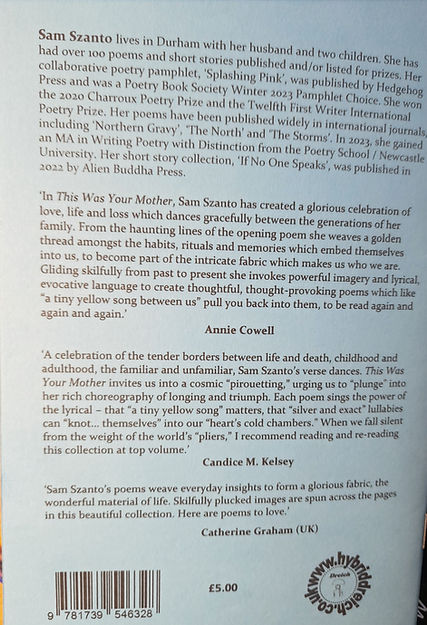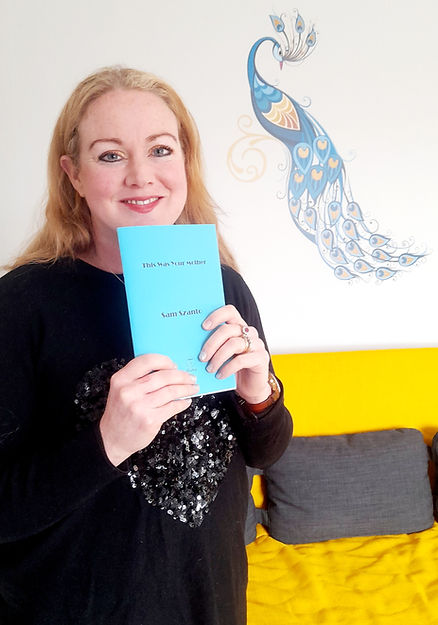20 Questions with... Diana Rosen
- samszanto2
- Oct 27, 2022
- 7 min read

Diana Rosen's writing began with a gift from a beloved aunt: a diary complete with lock and key! That segued into high school newspaper work that led to a mass communications degree and a lifetime of words, words, words for newspapers, advertising, P.R., and 13 books on food, beverage and lifestyle topics. She now writes about food and beverage for websites (for her left brain, and the paycheck) and flash and poems (for her right brain for the joy.) Although a poet, and flash writer, for 20+ years with publications in Rattle, Tiferet Journal, Words for the Wild, Existere Journal of Arts & Literature, and others, she did not publish a full-length book until 2022 with High Stakes & Expectations. Diana lives and works in Los Angeles where her "backyard" is the 4,000+acre Griffith Park, the largest urban green space in the country. She has been a Docent since 2009 for the Central Library of Los Angeles where she guides tours of the U.S. National Landmark, an art deco/beaux arts building.
Website: www.authory.com/dianarosen
Book publisher: www.thetinypublisher.com
Twitter: https://twitter.com/dianarosen
Facebook: https://www.facebook.com/diana.rosen.77
Please introduce yourself. Where are you from? What was your life like growing up?
I grew up in a small coal-mining town in southwest Pennsylvania and had, for the most part, an idyllic childhood where no one locked their doors, playmates were plenty, and my sister and I had the advantages of living with our grandmother, although my mother didn’t share that enthusiasm. And, folks ask, “Where do you get your ideas from?”
Did you always want to be a writer? If you also work, what do you do / did you do?
A dear aunt gave me a diary (with a lock!) when I was ten, and was my first writing experience outside of school. I majored in journalism and pursued that, plus advertising copywriting and public relations for most of my life, and now provide content for websites. About 25 years ago, while staging writer events at a bookstore, I was introduced to contemporary poets; up til then poets meant Byron, Shelley, Keats, Dylan Thomas, and lyrics of Broadway shows.
Tell us about your most recently published work in a sentence.
High Stakes & Expectations is a full-length flash and poetry book of stories about the risks we take and the hopeful expectations we have yet to experience.

What are you working on right now?
I’m working on two flash books; one is on family stories, the other is a melange of short and shorter flash about “everything”.
Do you have a writing routine, and if so what is it?
Because I work for my name on a check, I pursue all commercial assignments first thing, then I work on any personal projects. Still, sometimes I wake up with either an idea for a poem or a fully-realized poem in my head and hope the few steps to my desk won’t shake the words out of my mind as I type up what I think is the latest idea. I’m a workshop/class junkie and, unlike a lot of writers, I love the response-to-prompt assignments made in these classes. The prompt usually propels me to deep dive and often I come up with terrific gems to fiddle with into a flash or poem.
Where do you write – always in the same space, or different places? Can you write ‘on the move’?
I’m not one to write ‘on the move’ but I certainly do get inspired to write while taking public transportation or walks around my neighbourhood. The world is so rich with people and events that inspire my work. I live in Los Angeles, which is huge (502 square miles) and populated by 8+ million people, so plenty of stories to mine just for the observing.
What advice do you have for other authors who are starting out? What is the best advice you’ve heard?
The best advice I ever received was to “dig deeper” and the best advice I can give to anyone starting out on the writing adventure is to write the stories you want to read (paraphrased from Toni Morrison.) Read widely and critically. And, absolutely study with good teachers and learn the basics; you can always break the conventions later. Lastly, and probably most importantly, get out of yourself. Travel or learn more about your own town, interact with other people, have experiences. Live. While some people have such wild imaginations that they can create entire worlds on the page, some of us don’t, so we need to rely on observation, experience, and cultivating an understanding of our immediate worlds to conjure up ideas to put pen to the page.
Do you enjoy doing live readings or are they a necessary evil – or somewhere in between?
In the Before Covid Times, I’d relish live readings, primarily to get a reaction to what I write. Although I admit to being nervous before reading, the ham in me loves to perform. Now that I’ve experienced reading (and listening to readings) on Zoom and other platforms, I love that even more, although I do miss the visceral reactions from a live audience. Covid is still a serious concern here, so I’m opting for safety first for now.
Are there recurring themes in your work? Where do you feel these emanate from if so?
From the time I was 12 to 17, at least a half dozen of my family died, including my mother. The reality that death happens, that it brings a sense of loss we must learn to reconcile, underpins a lot of my work. As I’ve aged my work has become lighter, more sensuous, and more hopeful. Even though I continue to mourn the newer losses of contemporaries, I more fully understand that life goes on and joy will be possible again.
Should writers have a moral purpose? What is the purpose of a writer in today’s society?
Everyone, writers or not, should cleave to some moral convictions to guide them through the inevitable ups and downs of their lives and the world around them. Moral purpose is so varied, it’s best left to clergy and philosophers to write about it. I think the purpose of the writer in today’s society is two-fold: to use their medium to champion their political points of view or to entertain, to delight, comfort, excite, inspire, as we can. Life is tough and the writer’s words can be a balm for others at the end of the day. And, if you get addicted, it only helps mind and body!
Do you write between genres or not?
Not exactly; pretty much everything I write is some type of literary fiction or nonfiction like flash, short stories, and poetry although I have written blogs and essays on a variety of nonfiction topics. Sci-fi, dystopian themes, mysteries, and romance are all beyond me. Otherwise, my writing is commercial articles on food and beverage.
Which living writers do you most admire?
Hard to choose! I love the poetry of Margaret Atwood (so witty!) and the imagination of Anne Carson (Autobiography of Red!) and many others like Jane Shore, Richard Jones, Kim Dower, Gerald Stern, Grace Schulman, Philip Schultz, Naomi Shaib Nye…
Which dead writers do you most admire?
Pablo Neruda, Yehuda Amichai, Philip Larkin, Jane Kenyon, Lisel Mueller, Jack Gilbert ...
What’s the book you wish you’d written?
I don’t think that way. I admire well-written books, but I know what I can do and who I am and I am me, no one else.
What other external influences do you have: nature/place, music, etc?
I like to play music not so much to inspire, but to set my body free, to loosen it up so to speak, so the muse can enter. That said, music is only a preamble; I need to write in silence. The other influence is to see both my favourite works of art at local museums and exciting contemporary art which seems to shake out cobwebs from my mind. Also, the vividness of colour seems to do something to my word choices.
Do you suffer from ‘writer’s block’ and how do you overcome it if so?
I don’t really think of periods of not writing as blocks; instead, they’re times of rest, regeneration, gestation. Everyone needs a Sabbath away from work.
What’s been your favourite reaction to your writing?
Two come to mind: that collective sigh or nod of recognition in a live audience and another time after an in-person reading along with some quiet readers, a woman leaned over to me when I sat back down and said, “You were lively!”
How do your family and friends feel about your writing?
I have a terrific support system of friends and family. They buy my books, come to readings, acknowledge my posts of newly published works. I’m so grateful.
Do you have a favourite bookshop?
Skylight Books in my Los Angeles neighbourhood is the essence of a great shop: they’ll order anything for you, host great readings, and curate an astonishing variety of books in all topics, especially poetry. And, they’re in walking distance! A second choice is Vroman’s in Pasadena which also has a killer stationery and pen section; be still my heart!
How do you see the future of writing? Will we become more or less dependent on Amazon?
As long as people think, feel, and want to express ideas in words, there will be writers echoing those feelings and ideas in both fiction and nonfiction, so nothing will stop the written word. And, of course, Amazon has opened up a whole other world for self-publishing that continues to grow and expand to numerous platforms as new avenues to publish and distribute books. I totally understand the mixed feelings about Amazon as a behemoth retailer, and even though I shop locally as much as I can, the appeal of delivery to my doorstep is strong. I do want to add that integral to the preservation of the written word and support of newly published works is the public library system, which so far, here in the U.S., has more branches than McDonald’s has locations. Thanks be to Scotland-born Andrew Carnegie.

Fever
by Diana Rosen
We pace like pumas
flutter like birds
circle one another
‘til a sky of surety unites
sweet flowers of lips.
The Chinese astrologer
said we had once been
the same person. That
somehow the cosmos
split us apart
brought us back
together, or maybe we
are just two people
on the edge of loneliness
who did not run away
this time.










Comments